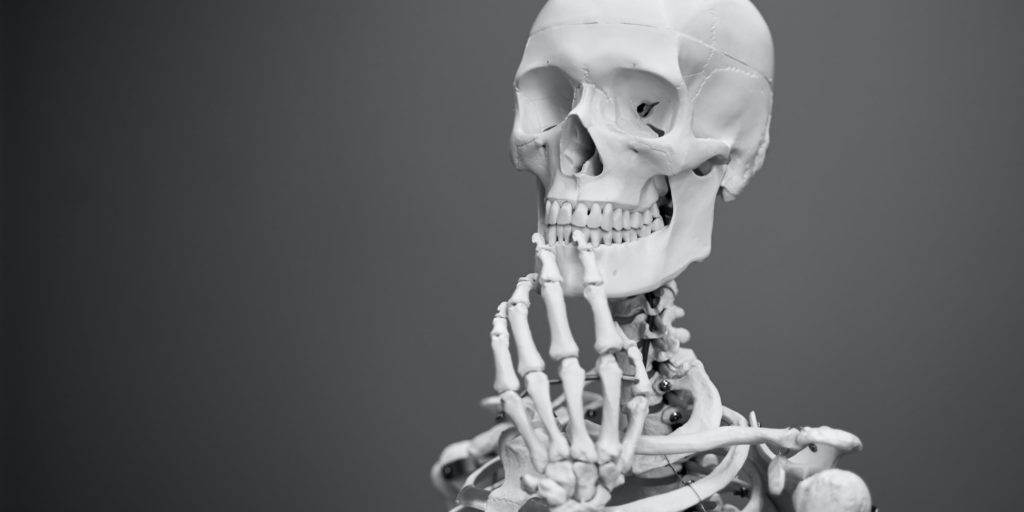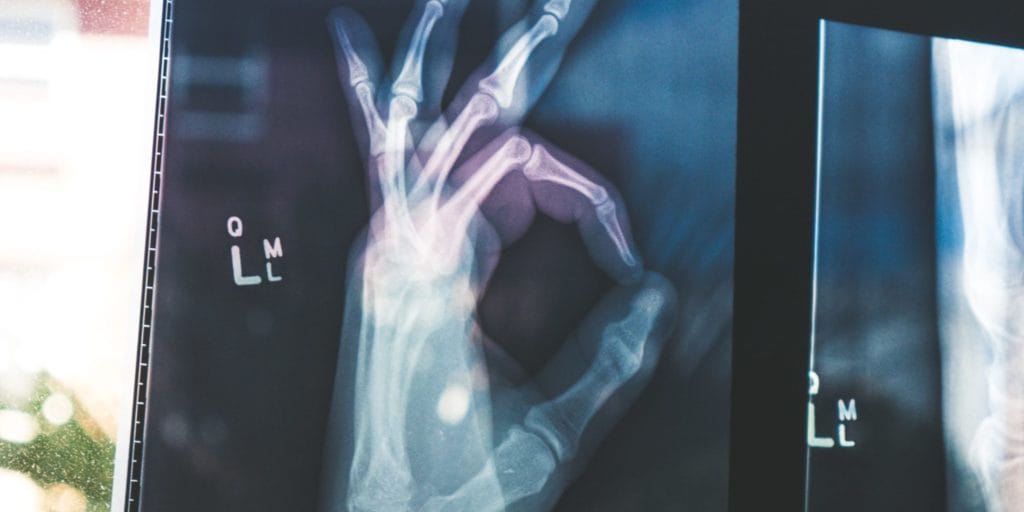Osteoporosis
What is osteoporosis?
Bone loss
Osteoporosis (bone atrophy) is a disease of the bones in which the relationship between bone formation and bone resorption, as well as bone density and bone quality, is disturbed. Our bone substance is subject to a constant build-up and breakdown process, which is controlled by two different cell types. Osteoblasts are responsible for bone formation and osteoclasts for the breakdown of hard tissue. Until the age of 30 at the latest, the activity of the osteoblasts takes priority. At this time, bone density reaches its maximum (PBM=Peak Bone Mass). After this, the density of the bones slowly but steadily decreases. When women go through the menopause, oestrogen levels fall and a valuable protective factor for stable bones is lost, as the female sex hormones previously had a positive influence on the formation of hard tissue.

Often diagnosed too late
Osteoporosis develops imperceptibly for a long time, which means that the disease is generally diagnosed too late, often only after a suspected bone fracture. At an advanced stage, the bones in typical areas such as the neck of the femur, spine or forearm can often break under the influence of everyday forces that a healthy bone would have no problem withstanding. Even if bone pain occurs or movement is restricted, a great deal of bone mass has usually already been lost. Incidentally, pain in osteoporosis is an issue that is often neglected! The pain, often in the back, can be dull, aching or even stabbing and sometimes extremely severe. Osteoporosis not only affects older women, but increasingly also men, and bone loss often begins in early adulthood.
Primary and secondary osteoporosis
Primary osteoporosis is caused by the normal ageing process and can also be favoured by an unsuitable diet and too little exercise. Secondary osteoporosis is caused by illness or medication. Osteoporosis occurs most frequently in people who have to take cortisone long-term. However, chemotherapy drugs, proton pump inhibitors (gastric protection), anti-epileptic drugs, immunosuppressants and thyroid hormones can also favour osteoporosis. Kidney disease, cancer or thyroid disorders can also lead to osteoporosis.

Diagnosis and drug treatment
Inhibit bone resorption or promote bone formation
Bone density measurements and X-rays can be used to confirm a suspected case of osteoporosis. Drugs that either inhibit bone resorption or promote bone formation are available for the medical treatment of osteoporosis. The most commonly used osteoporosis drugs belong to the group of bisphosphonates. These reduce the breakdown of bone substance and can stabilise bone density. However, the success of treatment is only guaranteed if it is carried out very consistently and taken correctly, usually over several years. Treatment with female sex hormones (oestrogens) is mainly given to women under the age of 60 who suffer from mild forms of osteoporosis. Oestrogens are intended to remedy the hormone deficiency symptoms after a premature or regular menopause and counteract a loss of bone mass. Drug-based pain therapy is also frequently prescribed.
Is calcium supplementation necessary?
Calcium and vitamin D3 have established themselves in conventional medicine as the basic therapy for osteoporosis, and combination preparations are often prescribed. Calcium is an important building block for strong and healthy bones and vitamin D ensures, among other things, the incorporation of calcium into the bones. However, more and more voices are being raised in opposition to the administration of additional calcium. Recent studies indicate that additional calcium intake increases the risk of heart attacks and strokes and that the calcium supply in this country is sufficient anyway.

Vitamin D is undisputed!
The importance of vitamin D in osteoporosis and its prevention is, as already mentioned, also recognised in conventional medicine. Vitamin D3 (cholecalciferol) is the precursor of vitamin D (calcitriol) and is converted into active vitamin D in the body. It is important for the health of teeth, bones and muscles. It regulates the calcium and phosphate balance, controls the storage of calcium in the bones and protects against bone demineralisation after the menopause. Vitamin D can be attributed countless other positive properties. Our body can produce vitamin D itself; when our skin is exposed to the sun, vitamin D3 is formed there, which is then converted into vitamin D. However, the formation of vitamin D3 in the skin is influenced by many factors, e.g. the position of the sun, altitude above sea level, skin colour and the use of sun cream (vitamin D3 production is reduced by more than 97 percent from a sun protection factor of just 8!)
Vitamin D deficiency is widespread
In the winter months, any vitamin D reserves in the body and food are the only natural sources. Only about 20 per cent of the daily requirement can be covered by the latter. Vitamin D is found in some fatty foods, e.g. fatty fish, offal, eggs and, to a limited extent, dairy products. It can be assumed that at least 70% of the Swiss population has a vitamin D deficiency, which particularly affects older people. Vitamin D not only strengthens bones, but also improves coordination, balance and muscles. Therefore, with an adequate supply of vitamin D, not only are the consequences of falls less dangerous, but there are also significantly fewer falls in general! These facts are in favour of the fact that additional supplementation with vitamin D is very important.

Important aspects of prevention and treatment
Nutrition
A balanced diet with plenty of fresh vegetables and fruit and berries from organic farming, as well as protein-rich foods, especially from plant sources (e.g. pulses or soya), provides the necessary amount of vitamins, minerals and protein. This is crucial for the health of our bones and muscles, and indeed for the functioning of the entire organism. In the case of osteoporosis, it is also essential to ensure a sufficient intake of magnesium and vitamin K2, whereas we do not need to pay particular attention to calcium intake in our latitudes, as we get enough of it. However, a diet high in fat and salt impairs calcium absorption and too much protein from animal sources can upset the acid-base balance and cause calcium and magnesium to be released from the bones. Industrial flours and sugar are also not recommended.
Exercise
Regular physical activity and And strain on the skeleton promote bone metabolism and strengthen the bones Bones. Regular exercise also strengthens the muscles and improves mobility and balance improves mobility and the sense of balance. Both of these the risk of falling, which can prevent the dreaded bone fractures can be avoided. Exercise, sport and strength training are therefore Are therefore essential for osteoporosis and lead to a noticeably better quality of life. Muscle-building and balance exercises are particularly recommended. It regular walking, hiking or Nordic walking, as well as moderate strength training moderate strength training, medical training therapy and targeted gymnastics or stretching exercises Gymnastics or stretching exercises. Sports with fast, abrupt movements, or where there is a high risk of falling are less advisable. For special anti-fall training programmes are also available for older people to prevent falls, this includes looking at the situation in their own home and eliminating any tripping hazards eliminated.

A healthy diet and the importance of vital substances
A balanced and healthy diet that ensures a supply with all the vital substances that are important for physical health can prevent many illnesses and support the body when it is ill. As nutrition is hardly possible in this day and age, in certain cases nutritional supplements can offer help in certain cases.